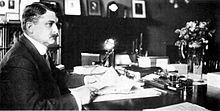Samuel Wesley Stratton
| Samuel W. Stratton | |
|---|---|

Samuel Wesley Stratton, 1905
|
|
| President of the Massachusetts Institute of Technology | |
|
In office 1921–1930 |
|
| Preceded by | Elihu Thomson |
| Succeeded by | Karl Taylor Compton |
| Personal details | |
| Born |
July 18, 1861 Litchfield, Illinois |
| Died | October 18, 1931 (aged 70) Boston, Massachusetts |
| Alma mater | Illinois Industrial University at Urbana |
Samuel Wesley Stratton (July 18, 1861 – October 18, 1931) was an administrator in the American government, physicist, and educator.
Stratton was born on farm in Litchfield, Illinois on July 18, 1861. In his youth he kept farm machinery in repair and worked as a mechanic and carpenter. He worked his way through Illinois Industrial University at Urbana (later the University of Illinois), receiving his Bachelor of Science degree in mechanical engineering in 1884. He became an instructor in mathematics and physics there, organized the department of electrical engineering and became its first head. By 1889 he was Professor of Physics and Electrical Engineering. He moved to the University of Chicago in 1892 as Assistant Professor of Physics, then Associate Professor in 1895 and Professor in 1898.
Stratton served in the Illinois Naval Militia from 1895, as a Lieutenant in the Navy in the Spanish–American War, and from 1904 to 1912 served as Commander in charge of the Naval Militia in the District of Columbia.
In 1899 he was asked to head the U.S. Coast and Geodetic Survey's Office of Weights and Measures, where he developed the plan for the establishment of a bureau of standards. He won the support for his plans from Secretary of the Treasury Lyman J. Gage and in March 1901, President William McKinley appointed him the first director of the National Bureau of Standards. He served until 1923. Under his leadership it grew from 24 to 900 employees scattered over 14 buildings. His operation was designed to recruit recent college graduates, train them, and feed them into private industry and its higher salaries. His team was called "lowest-paid corps of first-rank scientists ever assembled by any government." The Bureau worked hand in glove with industry to undertake research that the private sector required but could not finance itself.
He was awarded the Elliott Cresson Medal of The Franklin Institute in 1912. In 1917 Stratton was awarded the Public Welfare Medal from the National Academy of Sciences.
...
Wikipedia
